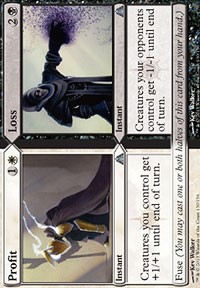Welcome back to Going for the Gold!
Unlike most hobbies, Magic has a competitive side where its best players compete in tournaments to win prizes in the form of special cards, invites to exclusive tournaments, and cold hard cash. Most players start off around their "kitchen table", playing for fun against friends before seeking more competition and eventually showing up at their LGS (local game store) to try to take down FNMs. After some time they travel to PPTQs, GPs and, hopefully, to the holy grail of competitive Magic; the elusive Pro Tour.
There are inherent costs in going to tournaments. That includes food, travel, tournament entry fees, and cards. So, how do you know if you are successful at Magic when it's so hard to track how you are doing? Well today we're going to tackle how to track your expenses and winnings in Magic.
We'll call this your Magic Bankroll. It will be a spreadsheet that you create in Excel. We will go into each aspect of the costs of Magic and which should be applied against your winnings. Let's start with the expenses.

Expenses:
Tournament Entry:
Most tournaments require you to spend a fair amount of money in order to enter, whether that comes with sealed product or not. When you spend money on a tournament you should write down its entry cost in your expenses. Whether it is an FNM, a PPTQ, a GP, or a SCG IQ/Open, you should write down the full cost in your bankroll. If the tournament entry comes with bonus sealed packs (like a Grand Prix that gives you six packs for entering) or a sealed pool, you should write down the amount that a store is willing to pay for either the packs or the valuable cards.
Food:
Would you eat if you didn't go to a Magic tournament? Most likely the answer is yes, even though you probably wouldn't eat out as much as you do. For this reason you shouldn't count this as a Magic expense. You can always brown bag it and bring a healthy lunch to save money in the long run.
Travel:
When you travel for GPs the cost keeps going up and up and up. Most of the time it's the hotel, but you also pay for gas or airplane fare. If the tournament is far enough away, you'll almost never win enough money to recoup those costs. Both of my Grand Prix Top 8s (Miami and Vegas) didn't pay for the travel costs of the tournament, and that's with over $1000 prize money each. For this reason, you should only include gas costs as a travel expense. Also consider the few GPs that you travel out to as a vacation. So once again, not a real cost since you would do this otherwise for your sanity.
Cards:
Finally, the last common expense for a Magic player is the acquisition of cards. When a constructed tournament is coming up, some players are lucky enough to be surrounded by a network that can provide them with the cards they need. The rest, however, will have to pay for their singles at card stores, often paying much higher than the card sells for. These cards should be expensed in your bankroll at the price you buy them at (including taxes). But you should also add their value (how much you could realistically sell them for) to your gains. Each of these transactions should typically leave you at a loss, unless you buy a collection at a discount that you can flip.
Gains:
Prizes:
Prizes are one of the biggest reasons we play Magic. Whether it's store credit at an FNM, or cash at a Grand Prix, the goal is to grind out a profit. However, some tournaments let you win boxes of product or play sets of valuable cards. If you win cash or store credit, make sure to add that to your bankroll.
Note: If you win store credit, make sure that you remember to spend it. So many players earn credit that they never use. This basically lets a store make money at your expense.
If you win product/cards, add the price that the store would pay for them to your gains.
For example: If you won a box of Dominaria at a tournament that you see on your LGS's shelves for $120, if you can only get $100 for it then you should add it as $100 to your bankroll.
Cards:
If you win cards as part of a tournament entry, tournament win, or from purchasing cards, you should add this as a gain to your bankroll at the store's purchase price.
Content Creation:
Another income stream for Magic professionals and players is to create content. We make this side income from writing articles, doing videos, and even streaming on Twitch. This can also be added onto your bankroll.
Flipping Cards:
Buying and selling cards is a profitable way to make money while playing Magic. When you sell for a profit, make sure that you include the transaction as a gain in your bankroll but under the flipping cards header.

You should review your bankroll every so often to check how you are doing. If your gains are dwarfing your expenses then you are doing well. As with poker, unless you track your wins versus your losses, you will never have a real idea of how you are doing. Most people overestimate how much they win and underestimate how much they lose. Tracking your results will give you a realistic picture and help you understand what your ROI in Magic is. It will also breakdown where most of your money is coming from.
I have attached a sample Magic bankroll tracker that I have created for you to use and fill out in Excel, and it is dynamic. I've filled it with a bunch of fake entries to give you an idea of how to use it. For the excel wizards you should enjoy using this template and for the not so tech-savvy readers, let me know if you need any help with it in the comments below.
Next week we're going to discuss a very important concept, The Mental Aspect of Magic. Until then, sit back and let's watch the world's finest play the three main constructed formats of choice this weekend at Pro Tour Minneapolis. Have a great weekend,
Sammy T


